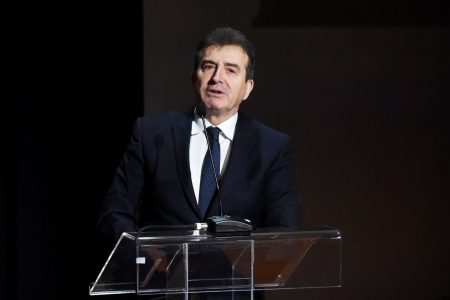One after the other, the steps are taken for the restoration of the Corinth Canal with the first goal to operate during the summer months. In the meantime, the Superfund is going to immediately put forward the elaboration of the master plan of total utilization of the Corinth Canal, proceeding to the assignment of a relevant study.
The execution of the works will last a total of 16 months, which will be “broken” in four month periods, with the first milestone next summer, so if everything goes according to plan, the Canal will operate again. About a year and a half after the crossing ban, the passage will remain open for 3-4 months and then will be closed again to continue the necessary work.
With the signing of the contract for the restoration project looming, the previous days the Ministry of Infrastructure and Transport approved the assignment of the contract of Technical Consultant – Designer to “ETHAFOS CONSULTING ENGINEERS SA”, for the execution of the works and committed 173,579 euros.
Recently, the Deputy Minister of Infrastructure, Mr. George Karagiannis, during the briefing of the Production and Trade Committee of the Parliament, spoke about a difficult and complex process in order to determine the technical solution of the restoration. An important factor was the need for a reasonable budget, but given the complexity of the restoration project, which is also evident from the fact that 730 boreholes were drilled along one kilometer of the project.
At the same time, the goal is to ensure the viability of the Corinth Canal, which is why the solution of the partial execution of the works was chosen, so that the crossing will be possible by summer.
The collapse and the blow to revenues
The continuous landslides from the slopes that occurred during the period between November 2020 and February 2021, causing serious damage led to the closure of the Canal. The culmination was the fall of a volume of soil about 15,000-20,000 m3 on February 3, 2021, which resulted in the ban on navigation for security reasons, depriving of course significant revenue and liquidity from the Corinth Canal Societe Anonyme (AEDIK).
The main sources of income of the company, which is a subsidiary of the Superfund, are the rights of passage, towing and navigation, which, however, has been registering zero for more than a year. It is noted that the turnover of the company in 2019 amounted to 5.19 million euros and in 2020 to 3.83 million euros. In order to meet its operational needs, the societe anonyme entered into two financing agreements in 2021, one of which concerns a loan of the parent company EESYP, amounting to 300,000 euros, for the immediate coverage of needs until the completion of negotiations with the banking institutions.
This was followed, last August, by the conclusion of an agreement with Piraeus Bank for an interest-bearing loan of up to the amount of 3.4 million euros. The disbursement of the loan, which is partial, is directly related to the progress of the restoration work of the Canal.
A chronicle of the last year
Of course, until we got to the fast pace of the last three months, a series of actions had preceded. In 2021, the Corinth Canal and its related restoration projects were characterized as a project of “National importance”. The necessary studies were carried out by the Ministry of Infrastructure and on November 22, 2021, the final study for the restoration of the slopes of the Canal, amounting to 1.3 million euros, was delivered. Next, the recovery schedule was designed in terms that enhance the commercial operation during the summer months.
In particular, the final study envisages: a) slope unburdening works and canal cleaning by May 2022, so that the canal will operate during the summer months and b) slope stabilization works that will begin in the fall of 2022. It instrument monitoring network of the project execution area has already been installed. This is one kilometer long, and will be a guide for the rest of the canal.
In order to deal with the problems, the following projects were studied and will be implemented, within the framework of the construction contract:
Construction of measures to strengthen the foundation of the southern pier of the sewage pipeline bridge.
• Excavations to remove the debris of the existing slopes.
• Surface water treatment and drainage projects.
• Cleaning of the Canal from landslide and lithospheric debris
• Construction of a pile-walled foot to ensure the protection of the foot of the canal slope.
The assignment of the project to AKTOR with a total budget of 30.6 million euros has already been approved since mid-December.
The decision of the Ministry of Environment and Energy was signed, according to which the projects for the restoration of the dams on the slopes of the canal are exempted from the obligation to comply with the environmental licensing process for two years, while the approval was given by the Coordinator of Decentralized Administration and Ionian of the Technical File of the project.
Also, a program agreement was signed with the Peloponnese Region and the Municipality of Loutraki – Perachora and Agios Theodoros for the fencing project along the Canal to enhance security. The project is in the auction phase and is expected to start in the next period.



